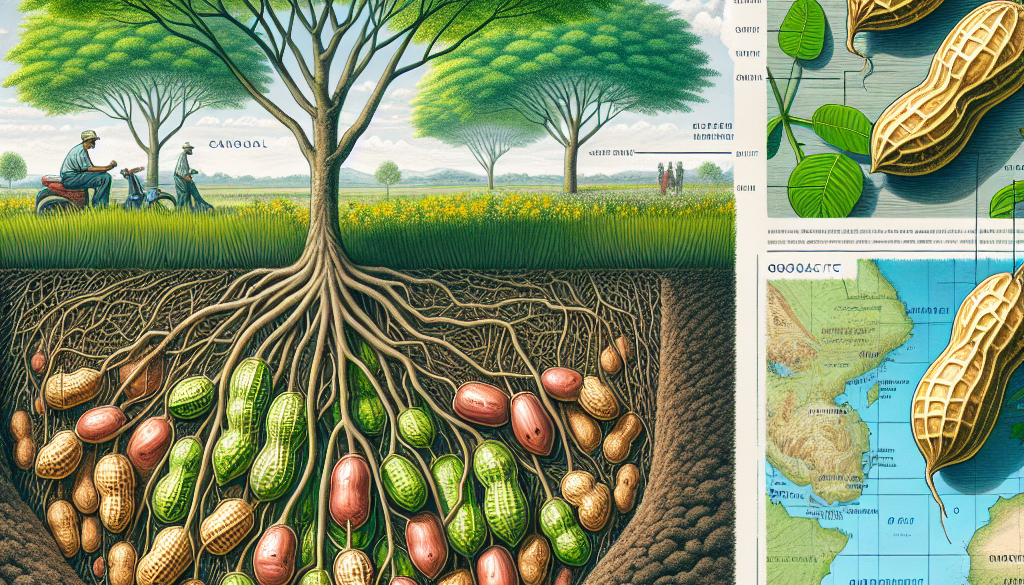Where Do Peanuts Grow Naturally: Unearthing The Nutty Truth
-
Table of Contents
- Peanuts: Unearthing the Nutty Truth of Their Natural Growth
- The Origins of Peanuts
- How Peanuts Grow
- Natural Habitats for Peanut Growth
- The Spread of Peanuts Around the World
- Peanuts in the Global Economy
- Environmental Impact and Sustainability
- Conclusion: The Nutty Truth Revealed
- Discover ETprotein’s High-Quality Peanut Protein Products
Peanuts: Unearthing the Nutty Truth of Their Natural Growth

Peanuts, despite their common association with nuts, are actually legumes, akin to beans and lentils. This fascinating crop has a rich history and a unique growth process that sets it apart from true tree nuts. In this article, we delve into the natural habitats of peanuts, their origins, and how they have become a staple in diets and economies around the world.
The Origins of Peanuts
The peanut, or Arachis hypogaea, is believed to have originated in South America, with evidence suggesting that it has been cultivated for thousands of years. Archaeological discoveries have unearthed peanut specimens in Peruvian tombs dating back to 3,500 years ago, indicating their significance in ancient cultures. The warm climates and fertile soils of regions such as Bolivia, Argentina, and Paraguay provided the perfect conditions for the peanut plant to thrive.
How Peanuts Grow
Unlike other nuts that grow on trees, peanuts develop underground. The peanut plant flowers above ground, and after pollination, the flower stalk elongates and bends towards the soil. The fertilized ovary, known as a peg, then grows down into the ground where the peanut matures inside a thin-shelled pod. This unique reproductive process is known as geocarpy, making peanuts a fascinating subject of study for botanists and agricultural scientists.
Natural Habitats for Peanut Growth
Peanuts require specific conditions to grow naturally. They thrive in warm climates with well-drained soil, preferably sandy loam soil. The natural habitats where peanuts are found include:
- Subtropical and tropical regions with long, warm growing seasons.
- Areas with moderate rainfall, as excessive moisture can lead to fungal diseases.
- Regions with light-textured soils that allow the pegs to penetrate easily and the pods to develop without resistance.
These conditions are predominantly found in the regions where peanuts are believed to have originated, as well as in other parts of the world where they have been introduced and cultivated.
The Spread of Peanuts Around the World
The journey of the peanut from South America to the rest of the world is a testament to human migration and trade. Spanish and Portuguese explorers and traders introduced peanuts to Africa and Asia, where they quickly became integrated into local cuisines and agricultural practices. From Africa, peanuts made their way to North America during the transatlantic slave trade, where they were initially used as food for livestock and later for human consumption.
Peanuts in the Global Economy
Today, peanuts are a global commodity, grown in many countries across the world. The top peanut-producing countries include:
- China
- India
- Nigeria
- United States
- Indonesia
These countries have the ideal climates and soil conditions for peanut cultivation, and they contribute significantly to the global supply of peanuts for consumption and production of peanut oil, butter, and other products.
Environmental Impact and Sustainability
The cultivation of peanuts can have both positive and negative environmental impacts. On the positive side, peanuts have nitrogen-fixing properties, which means they can enrich the soil with nitrogen and reduce the need for chemical fertilizers. However, like any crop, peanut farming can lead to soil depletion and erosion if not managed sustainably. It is crucial for peanut farmers to employ crop rotation and other sustainable practices to maintain soil health and productivity.
Conclusion: The Nutty Truth Revealed
Peanuts have a unique growth process and natural habitat that distinguish them from other nuts. Originating in South America, they have spread across the globe and become a vital part of agriculture and diets in many countries. Understanding where peanuts grow naturally helps us appreciate the environmental conditions necessary for their cultivation and the importance of sustainable farming practices to ensure their continued availability.
Discover ETprotein’s High-Quality Peanut Protein Products
If you’re interested in incorporating the nutritional benefits of peanuts into your diet, ETprotein offers a range of high-quality peanut protein products. Their peanut protein is perfect for those looking to enhance their protein intake with a plant-based option. ETprotein’s commitment to non-GMO, allergen-free products ensures that you’re getting the best quality for your nutritional needs.
About ETprotein:
ETprotein, a reputable protein Chinese factory manufacturer and supplier, is renowned for producing, stocking, exporting, and delivering the highest quality organic bulk vegan protein and plant proteins. They include Organic rice protein, clear rice protein, pea protein, clear pea protein, pumpkin seed protein, sunflower seed protein, mung bean protein, peanut protein etc. Their offerings, characterized by a neutral taste, non-GMO, allergen-free attributes, cater to a diverse range of industries. They serve nutraceutical, pharmaceutical, cosmeceutical, veterinary, as well as food and beverage finished product distributors, traders, and manufacturers across Europe, USA, Canada, Australia, Thailand, Japan, Korea, Brazil, and Chile, among others.
ETprotein specialization includes exporting and delivering tailor-made protein powder and finished nutritional supplements. Their extensive product range covers sectors like Food and Beverage, Sports Nutrition, Weight Management, Dietary Supplements, Health and Wellness Products, and Infant Formula, ensuring comprehensive solutions to meet all your protein needs.
As a trusted company by leading global food and beverage brands and Fortune 500 companies, ETprotein reinforces China’s reputation in the global arena. For more information or to sample their products, please contact them and email sales(at)ETprotein.com today.












